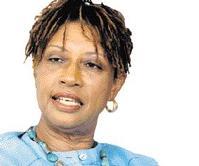
Beverley Anderson -Manley
In identifying the causal relationships that produce and sustain violence in poor urban communities in Jamaica, a World Bank Study on urban poverty and violence in Jamaica notes the inter-relationship between the violence-poverty-social institution nexus and the ways in which these three elements can provide appropriate interventions to break this cycle.
Criminal elements in the Jamaican society continue to soak the Jamaican earth with the blood, sweat and tears of our women, men and children. As the murder rate decreases, it seems that the nature of crime is becoming more and more senseless and brutal.
Last week, for example, there was a brazen and horrible murder in the afternoon. Derrick Lewis, the Chetola Park Primary School coach was murdered in front of students and teachers just before the start of the Kingston and St. Andrew Primary league match at the playing field behind the Tinson Pen aerodrome in St. Andrew. As both coach and security guard for the school, Lewis was protector of these children, many of whom do not have a father figure in their lives. When the protector is murdered in front of his flock, who takes care of his flock? The lone gunman simply walked up to Lewis and in front of everyone, shot him in the head. As Lewis lay on the ground, his attacker shot him once more.
Violence in the Community
The war in Rockfort last week continued for days with several houses being fire-bombed. It is alleged that gang members who support the People's National Party (PNP) are warring against each other. These gang members have deadly high-powered rifles that outdo anything the police have. At one stage, the police called on members of the Rockfort community to protect themselves as they could not protect them. The impact of this type of criminality on the community and the society generally is huge and cannot be overemphasised.
How much longer can we continue to live in a country where we feel unsafe and where it appears that the Government can do little about it? Many have tried. There have been several committees formed. The Peace Management Unit (PMI) is doing
a commendable job. There are
many non-government organisations that are working every day to make things better. Yet the downward cycle of crime and violence continues to spin out of control.
Needed - A Powerful Intervention by the State
What is needed is the kind of powerful intervention by the state - the likes of which we have never seen before. For example, is it beyond us to intervene in the cycle of violence by putting in place social interventions in a number of communities simultaneously backed by community policing?
As we contemplate these social interventions, let us do so within the context of the violence-poverty-social institution nexus. We have to stop putting out these "bush fires" and deal with the entire "forest." In keeping with this, perhaps the next time our parliamentarians meet in Parliament they could come with a collective mindset that is prepared to find the money to deal with effective policing and social interventions.
When we need money for other things, we seem to find it. The time has come for us to find the resources so we can begin to show the perpetrators of crime what peace looks like. Many of our young people have grown up in war and don't even know what peace looks like. Why should any inner-city young person give peace a chance when peace is a concept that is absent from their paradigm?
Forty-four years after political independence, it is time as citizens to take responsibility and check the extent to which we have colluded in this conspiracy of crime, violence and corruption. It is time to admit that no matter how well intentioned, we have failed the majority of the Jamaican people, particularly our young people. This recognition can open up possibilities to do things differently. We are desperately in need of alternative ways of being and doing things.
Beverley Manley is a political scientist and gender specialist. Email: BManley@kasnet.com

